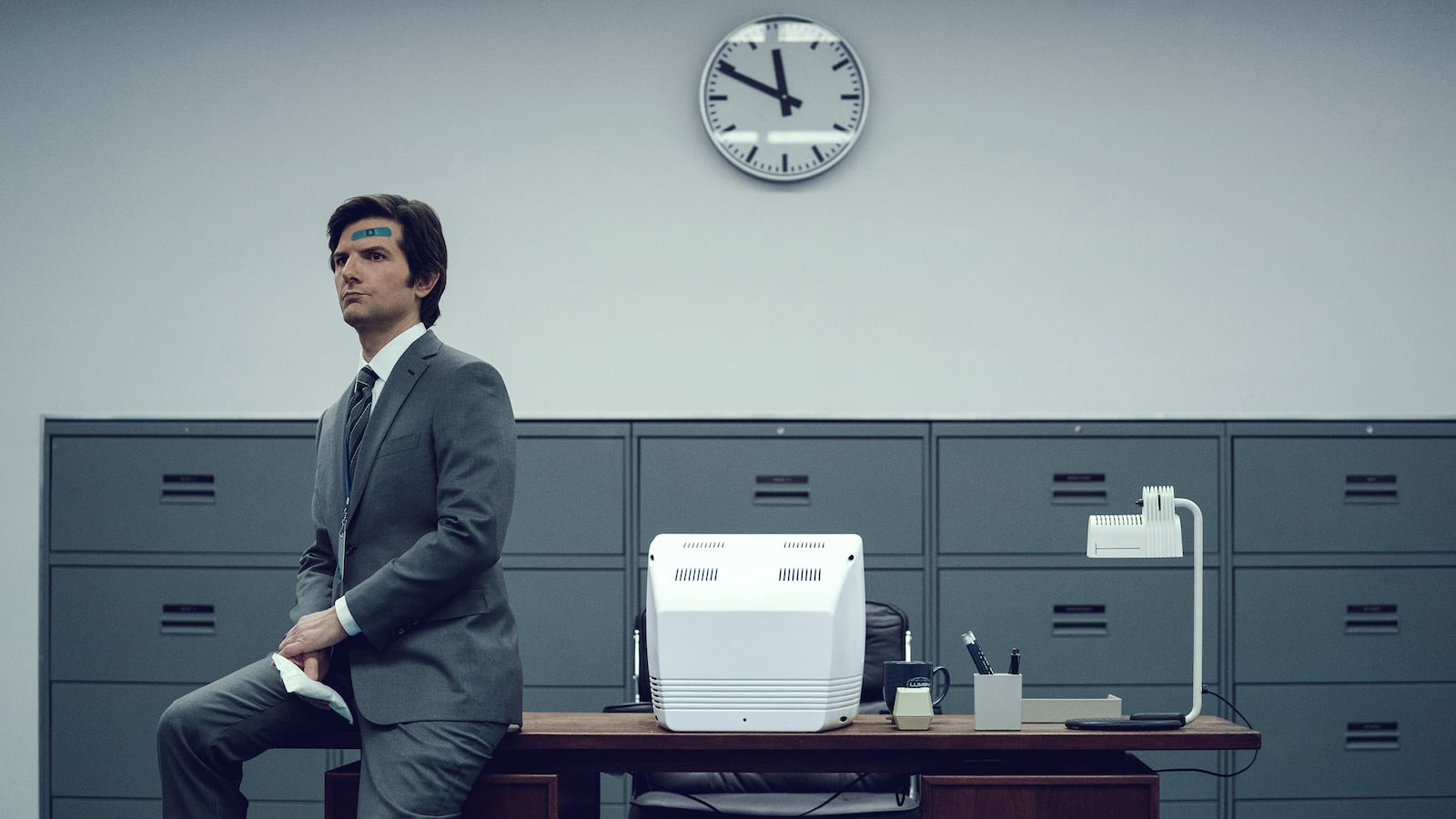The last time a new Apple TV+ series became a word-of-mouth sensation, it was Ted Lasso, which saw its popularity build at about the same rate as our anxiety and dread during the first harrowing months of the pandemic—which is to say, uh, quite fast. We were stuck at home. Things were bleak. The unflappable optimism, earnest worldview, and Foghorn Leghorn-turned-Everyman witticisms of Ted were both a salve and a guiding light through the darkness.
Another new Apple TV+ series is starting to draw rumblings of that same enthusiasm that the gee-golly soccer coach did, albeit under quite different circumstances—though again with a canny, if entirely unplanned tone to mirror the current cultural mood.
Ted Lasso debuted when we were all adjusting to a new life working from home and needed some cheering up. Now employees are being called back to the office in droves. After two years of recalibrating a different kind of work-life balance, they aren’t exactly over the moon about it and need to vent.
Enter Severance, a series in which the act of going into an office and working every day for a corporate entity is portrayed as psychological torture and a real-life manifestation of a dystopian horror film.
I can’t imagine why, at this moment, a series like this seems to be resonating. A great mystery. Who could say? (It’s also funny, because you have to laugh…)
The series, which is directed by Ben Stiller, premiered its third episode Friday on Apple’s streaming service, several days after Gracie Mansion’s jester-in-residence, New York City Mayor Eric Adams, urged companies to mandate that workers return to the office, arguing that the remote work is unsustainable.
“You can’t stay home in your pajamas all day,” he said, as both a challenge to those who have grown accustomed to the khaki-free life—“I can and I will” is one impassioned response to the PJs moratorium—and a gross ignorance of those who have discovered remote work to be a miraculous solution to the burnout and logistical prison that commuting and being tethered to an office desk all day fostered, particularly for working parents.
When they dreamt up the show, the creative team behind Severance could never have imagined that existential musings of “what does working mean today?” would be less heady philosophizing to roll your eyes at than a headline-making, trending question of urgency. It was years before anyone knew what a pandemic was, and the idea of work-life balance was less an equilibrium than a teeter-totter with the “life” half dug into the ground while the “work” part stretched toward the moon. But its arrival at this particular time couldn’t be more perfect.
Severance, in the case of this series, refers to a controversial procedure that is becoming normalized and popular. By their own free will, an employee of a major corporation can agree to become a “severed” worker, which means undergoing a brain surgery the result of which completely bifurcates a person’s personal life and professional life, including all memories of each. While at work, they have no awareness or recollection of who they are or what happens when they are outside the office, and vice versa.
The solution to trying to maintain a work-life balance: stop trying. Why fail at “having it all” when you can succeed at having half, depending on the time of the day? That famous fawning, “I don’t know how she does it!” Well, she doesn’t give a shit about work while she’s home, and the rest of the world is dead to her while she’s working. And it doesn’t take any effort to compartmentalize; her brain is now hardwired to do so.
“It doesn’t mess with your head?” one character, intrigued by the procedure, asks Mark (Adam Scott; listen to my colleague Matt Wilstein’s interview with him here). Mark is a severed worker for a company called Lumon. “I think for some people, that’s the point,” he replies.
In his “outie” life, which refers to his existence outside of Lumon, his wife has died and he’s dealing with depression and an unhealthy alcohol habit. In his “innie” life, he and his colleagues collect data alone as a foursome under the watchful eye of executive overlords who enforce strict, infantilizing protocols. This is just fine for Mark, both the innie and outie version, until things start getting complicated—which is exactly what he got severed to avoid.
If we’re being honest, the concept of severance does seem appealing, especially given the state of modern work culture. The show wouldn’t work otherwise.
Maybe a 9-to-5 wouldn’t feel as mind-numbing if there was no context of an outside world. Maybe the endless pursuit of Inbox Zero wouldn’t pummel at your will to live and rob you of trivial things like “relaxing, ever” or “sleeping at night” if an inbox ceased to exist the second you clocked out for the day. (As a person with current inbox: 90,933—that is not an exaggerated number—I’m in. Don’t even get me started at the notion of clocking out for the day. What is this, the ’50s? In other words: Sever me, daddy.)
And maybe, too, you would be more productive if you weren’t preoccupied by a fight with your spouse, figuring out your kids’ schedule, or thinking about how to fix The Real Housewives of New York City (speaking hypothetically, of course…) as you try to do work.

The genius of Severance, however, and the reason why everyone who’s been watching it has been unable to shake it, is the slow-burn revelation that this isn’t an easy fix to a universal crisis. It is, as is everything to do with work culture and corporate incentive, nefarious and disturbing in ways we’re perhaps unprepared or unwilling to recognize we’re already on the path toward bringing to fruition.
Severance exposes the inevitability of something like this, a world in which we are lobotomized in order to better serve a company’s bottom line. The series will make you wince at its spot-on send-ups of the tactics employers take to gaslit staff into believing they’re satisfied. (One man won’t stop talking about the waffle party he could win if his numbers are strong enough.)
When Lumon’s newest severed employee, Helly, wakes up in a conference room, realizes she can’t remember anything about herself, and asks, “Am I livestock? Did you grow me for food?,” you’ll be tempted to do a survey of your own work history and how you may have been valued. Helly is trapped. She can’t escape and she can’t resign, which are one in the same, because resigning has to be signed off on by the “outie” version, and the “outie” version willingly agreed to this cubicle-bound, Groundhog Day hell.
As you watch the series, you’re haunted by its inevitability. Watching it unfold is as unsettling as any horror film or series you’ll watch this year. Each episode plays out like a darkly comedic thriller, with intense cliffhangers likely to ensure that Apple’s weekly release strategy will only continue to grow the show’s obsessive audience.
It’s a commentary on workplace culture that’s clever in its balance of fantasy, brutal realism, and humorous, heady ideology. It’s Kafka. It’s Kubrick. It’s Brené Brown and GOOP. As a whole, it’s a helluva bookend for this era of Apple TV+ programming.
Not that long ago we were giddy over Ted Lasso, swooning over a mustachioed soccer/life coach as he slapped his “Believe” sign and urged us to “be a goldfish” when facing life’s challenges. Severance offers up a much bleaker outlook: We’re screwed, and there may be no escape.







